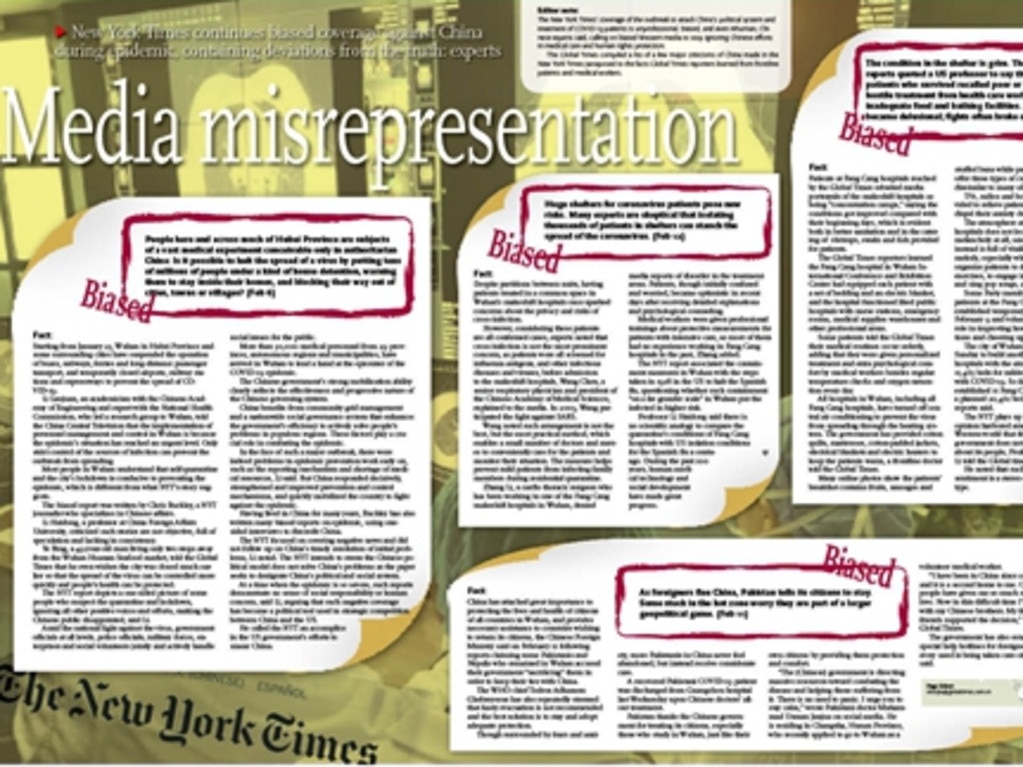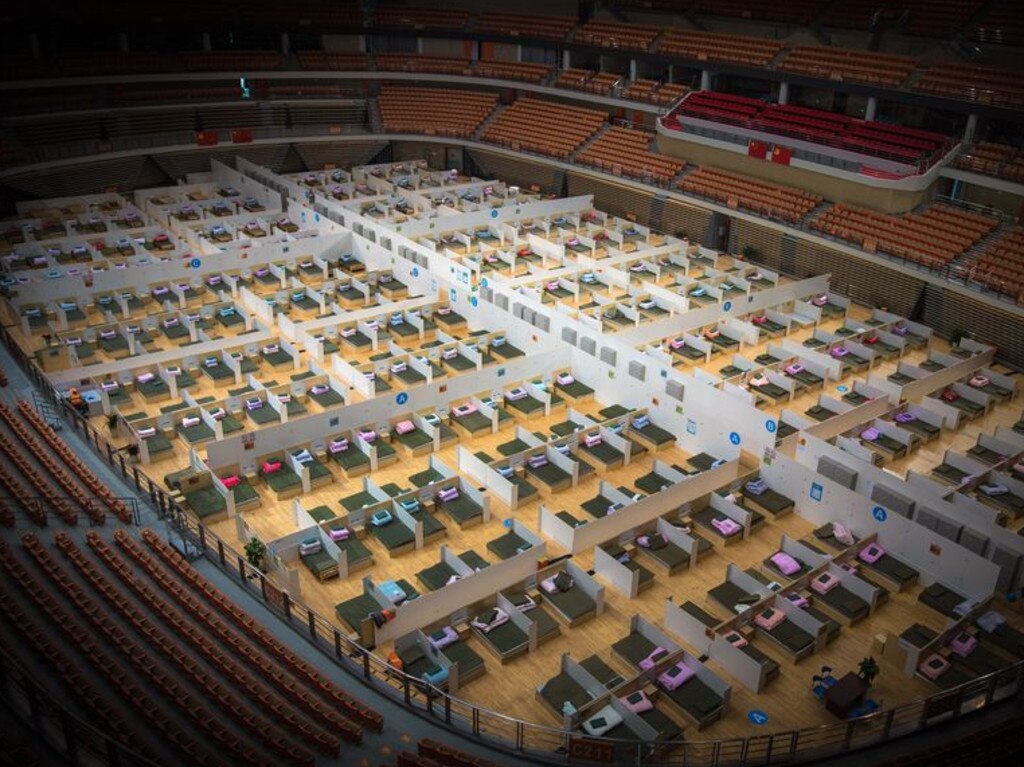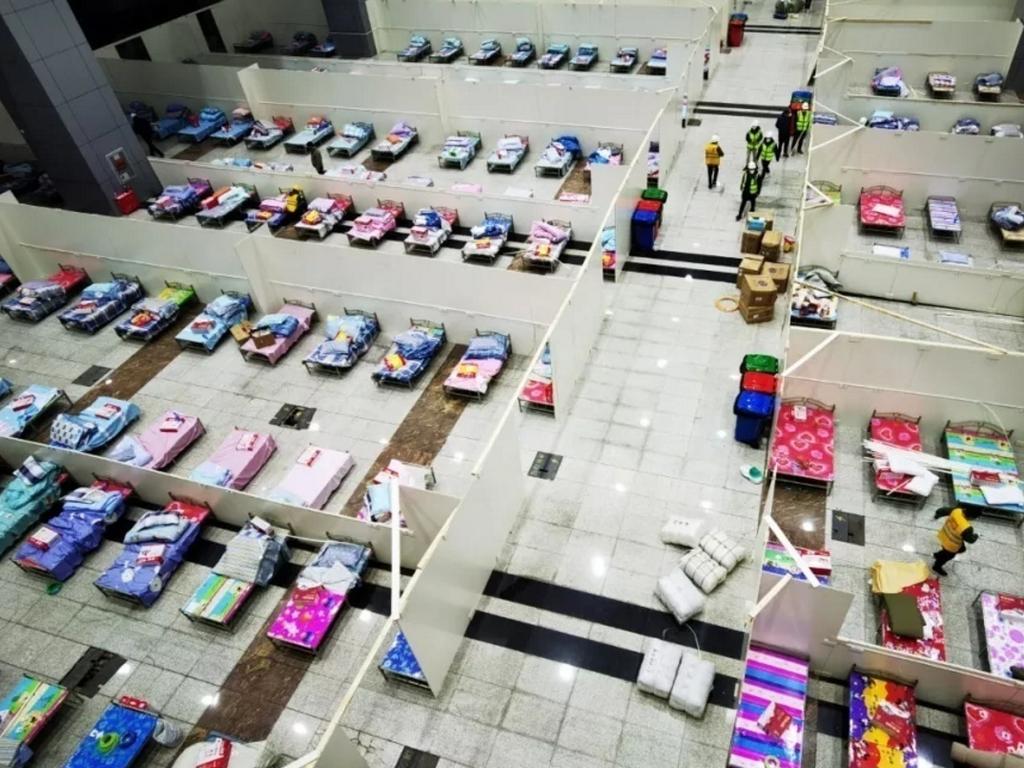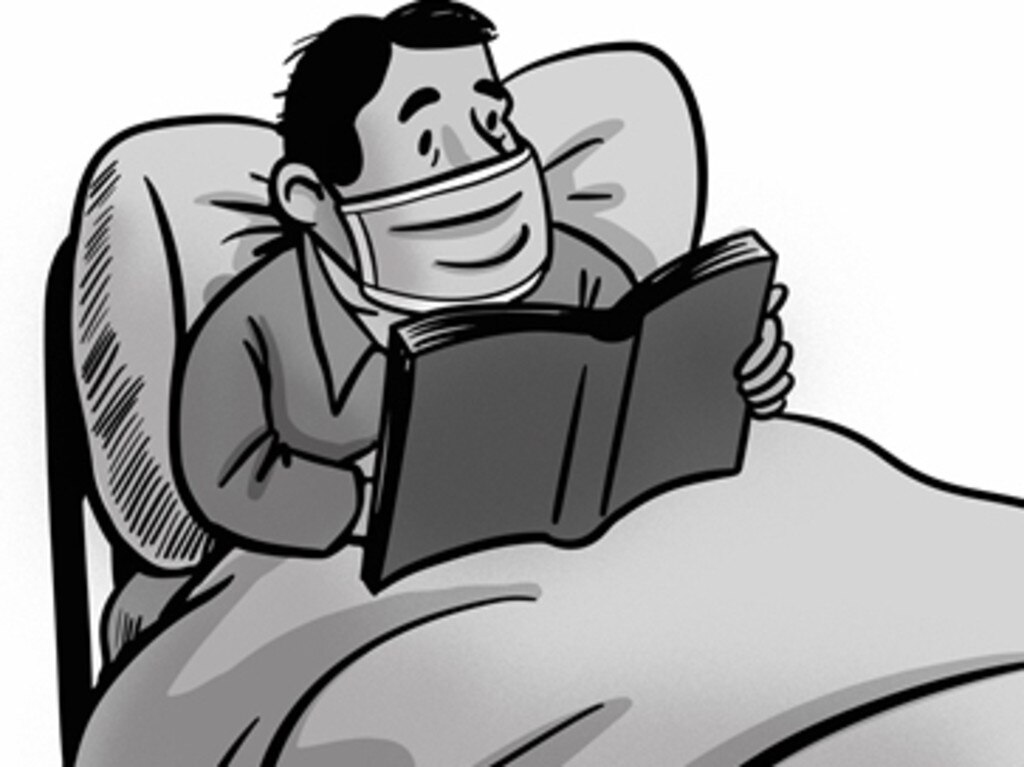China’s surreal coronavirus hospital claims
China has rejected reports of brutal conditions at its makeshift coronavirus hospitals, insisting patients “eat steak” and dance with doctors.
China has dismissed reports likening its makeshift coronavirus hospitals to “concentration camps” as inventions of a “biased" foreign media.
In a scathing editorial, the Global Times said overseas coverage of the outbreak,
which has killed more than 2300 people and infected almost 78,000, gave the impression “the Chinese Government does not care about its people”.
The state-run news outlet singled out The New York Times, accusing it of “playing up negative public opinion” and “ignoring” China’s efforts to contain the epidemic.
“The New York Times’ coverage of the outbreak to attack China’s political system and treatment of COVID-19 patients is unprofessional, biased, and even inhuman, Chinese experts said, calling on biased Western media to stop ignoring Chinese efforts in medical care and human rights protection,” the editorial said.
It comes a day after China expelled three journalists, including an Australian national, from the Wall Street Journal. If the tone of the editorial is anything to go by, the New York Times’ China bureau might be next.



In less than a month, Wuhan authorities have established 11 makeshift hospitals — known as Fang Cang hospitals — some built from scratch and others converted from stadiums, convention centres and gyms.
But videos showing the hastily built structures leaking badly and patients languishing in gruesome conditions have flooded Chinese social media platforms Weibo and WeChat, along with allegations of mistreatment, food shortages and a lack of bathing facilities.
Conditions are not great at these makeshift hospitals where patients in less critical condition are forced to stay. Thousands of people share a few bathrooms and some have to fight to get the free meals. Video from Weibo. pic.twitter.com/LJQy0PSEhy
— Xinyan Yu (@xinyanyu) February 6, 2020
The boasted Wuhan Fire Godness Mountain Quarantine Hospital was leaking water. It is not a good sign for CCP in Chinese culture as “Water†extinguishes “Fireâ€. How can such a superficial project that was completed with days work? pic.twitter.com/5JF4sRxOzd
— 西行å°å® (@htommy998) February 15, 2020
The leaking inside the hospitals in Wuhan that the chinese government built in 10 days for the #coronavirus
— Filippo Maria O di B 🇮🇹 🇺🇸 (@Filippo60) February 18, 2020
The world was stunned by the hard work and efficiency of the Chinese. They built these structures predicting a pandemic.
These are not hospitals, they are mortuaries. pic.twitter.com/JAvNJ0hCAj
The Global Times dismissed the footage as anti-China propaganda. In fact, it claimed, patients were fed a rich and varied diet that included “shrimps, steaks and fish”.
“All hospitals in Wuhan, including all Fang Cang (makeshift) hospitals, have turned off central airconditioning to prevent the virus from spreading through the heating system,” the editorial said.
“The Government has provided cotton quilts, mattresses, cotton-padded jackets, electrical blankets and electric heaters to keep the patients warm, a frontline doctor told the Global Times.
“Many online photos show the patients’ breakfast contains fruits, sausages and stuffed buns while patients’ lunch boxes offer three types of cuisine and rice, not dissimilar to many of their diets at home.
“TVs, radios and books are also provided to relieve patients’ boredom and dispel their anxiety during quarantine.”
“The atmosphere at the temporary hospitals does not look gloomy nor melancholy at all, said patients, but instead is full of vitality and an optimistic melody, especially when medical workers organise patients to do radio gymnastic exercises, to engage in popular dances and sing pop songs, and practice Tai-chi.”
Patients with mild are postive,they are dancing with doctors in converted hospital. in wuhan pic.twitter.com/PqF8LvIShZ
— Jessica (@Jessica9554) February 16, 2020
A doctor from Xinjiang dancing in a make shift hospital in Wuhan pic.twitter.com/hjXbIe0Hfl
— Zhenhua (@Zhenhua79603187) February 12, 2020
#Wuhan #nCoV19 #Coronavirus
— Haixiao Fan (@FanHaixiao) February 15, 2020
Patients were learning dancing from nurses and doctors who came from other provinces to support Wuhan.
That’s a good way to exercise and improve immunity. Virus can break the original peaceful life, but not the love, care and support from each other. pic.twitter.com/kC8P55FOoe
Another article carried a cartoon featuring a masked patient reading a book in bed accompanied by a caption emphasising life in a makeshift hospital was not all bad.
“Is life in an inpatient ward really that gloomy and full of despair? Some novel coronavirus pneumonia (COVID-19) patients in the epicentre have offered a very different answer,” it said.
“In Wuhan’s “Fangcang” makeshift hospitals, which are built to accommodate mildly infected cases, patients have found their own way to fight the virus.
As shown in videos and pictures posted online that record their daily life, dozens of patients are seen doing a synchronised dance by their beds.”

It also explained the inspiration behind the cartoon.
“A man lying in bed was seen reading Francis Fukuyama’s The Origins of Political Order,” the outlet said.
“His calmness, in contrast to the hectic ward, reassured many anxious hearts. Numerous internet users were deeply touched by these patients’ positive attitude.”
On Sunday, local authorities announced it would build 10 more temporary hospitals, providing another 11,465 beds for patients with “milder” cases of COVID-19, the disease caused by the new coronavirus.
The Chinese Communist Party has ramped up its propaganda machine in the wake of its decision to expel three Wall Street Journal reporters after it took offence to an article published by the newspaper on Wednesday.
According to the CCP, the story carried a “racist headline” which referred to China as “the sick man of Asia and refused to correct its attitude and tender a formal apology over the issue”.
The journalists have been identified as Chao Deng, Australian national Philip Wen, and deputy bureau chief Josh Chin. The trio has been give five days to leave the country.



